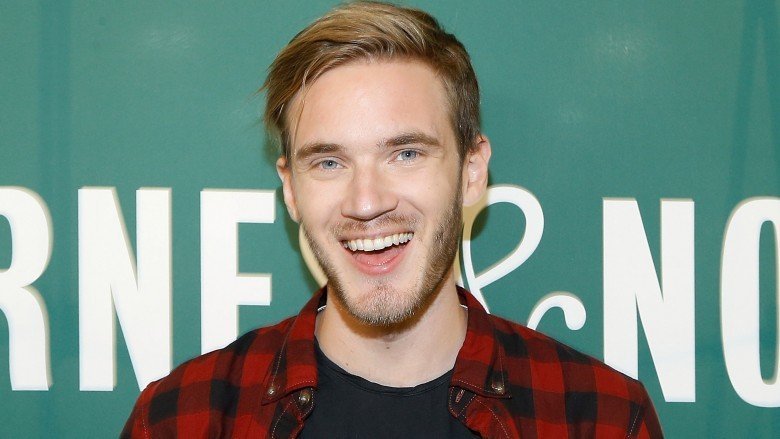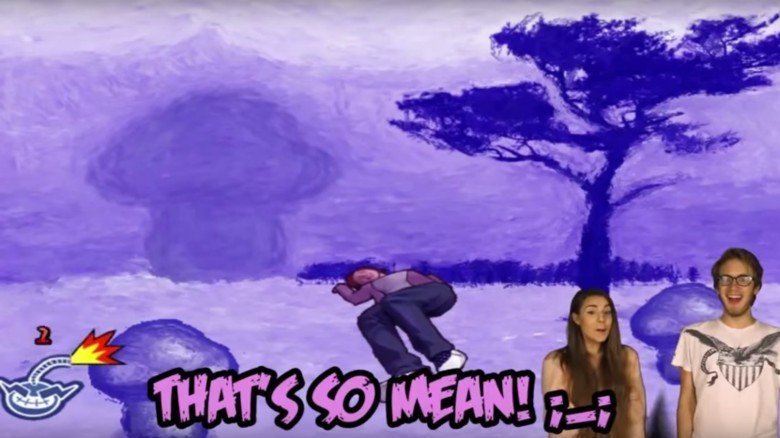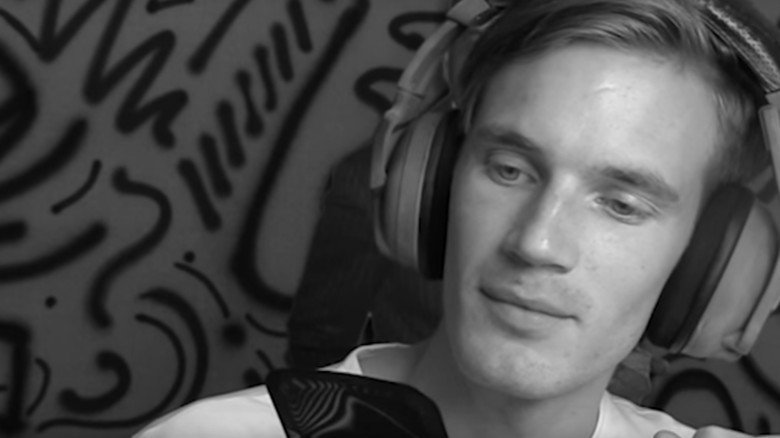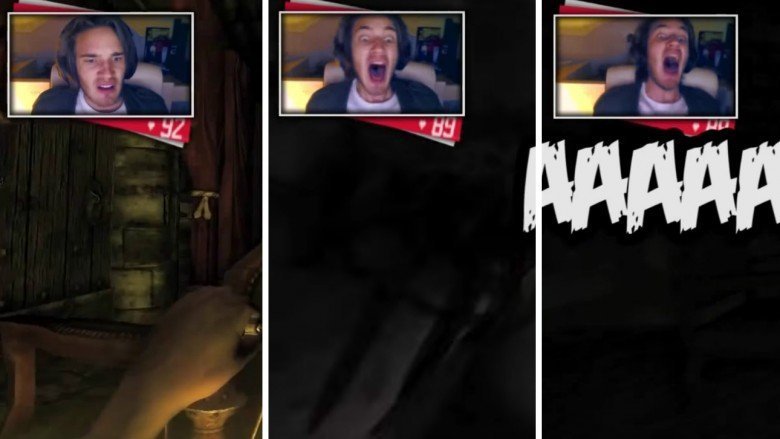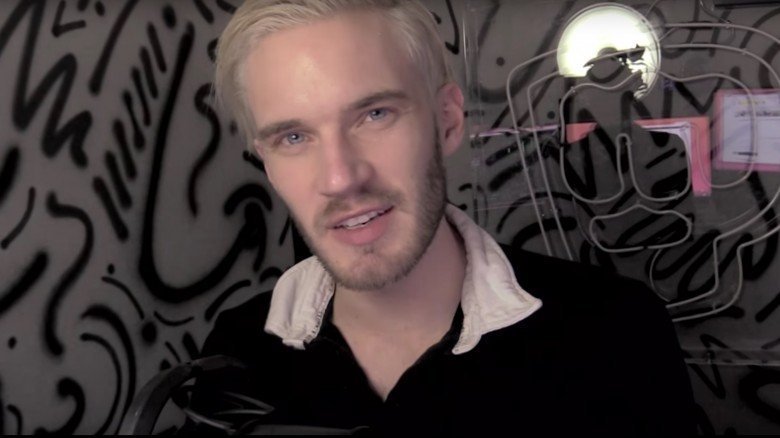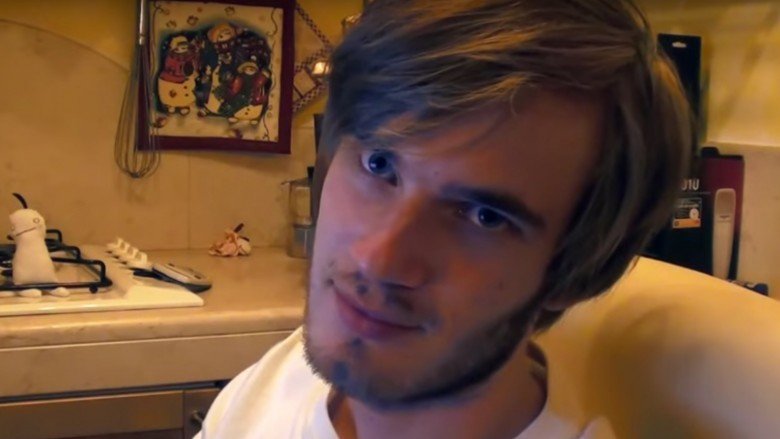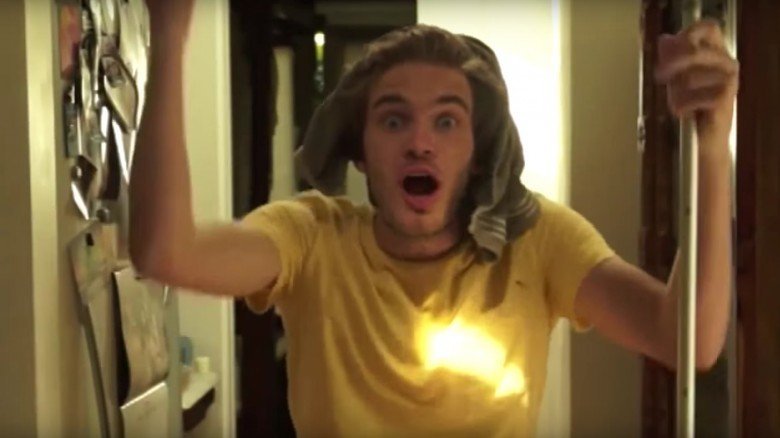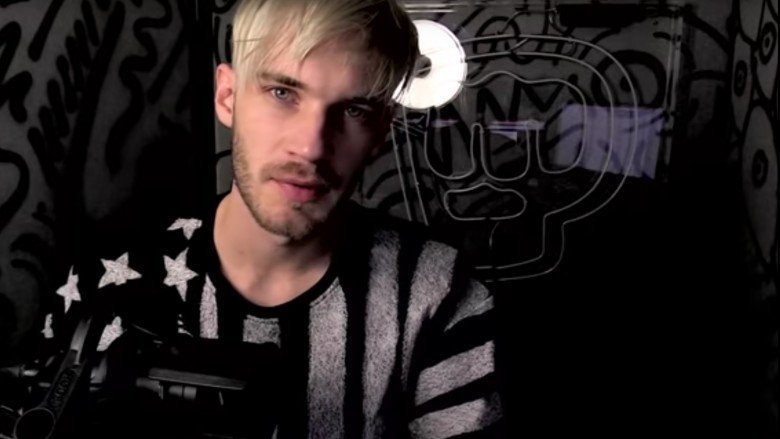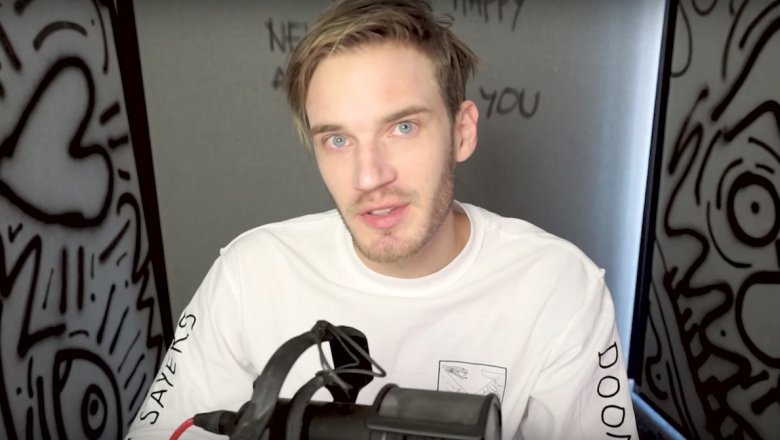Times PewDiePie Went Too Far
In February 2017, Felix "PewDiePie" Kjellberg lost his YouTube Red show Scare PewDiePie, his partnership with Disney affiliate Maker Studios, and his membership in YouTube's premium ad service. At this point, the PewDiePie brand has over 50 million subscribers and two licensed PewDiePie video games on Steam and other platforms. Disney's decision to end the deal between Maker Studios and Kjellberg had to do with the damage he caused the PewDiePie brand.
Bearing in mind that PewDiePie's cultural clout remains unparalleled in the weird world of YouTubers, we bring you our list of times YouTube's biggest star crossed the line.
Paying two guys to hold up a sign with an anti-Semitic slogan on it
In January 2017, PewDiePie paid two Indian men via Fiverr to film themselves holding a sign that read "Death to All Jews." (The men have since apologized, saying they didn't understand what the words meant. Once they found out, they professed to be appalled.)
PewDiePie claimed the Fiverr video was a social experiment, that "Death to All Jews" was simply "something absurd" to prove that people will do anything for money. Would he have considered it appropriate for comedy's sake to do a similar Fiverr campaign with "death to [insert virtually any other group identity]," or some genocidal equivalent? Gays, Latinos, East Asians, Africans... Any of these groups would have surely have been off-limits.
PewDiePie didn't start out his career answering to Disney; the company acquired Maker Studios in March 2014. As Peter Kafka of Re/Code pointed out in August 2015, "When Disney bought Maker, skeptics argued that it had overpaid for the money-losing business, since it didn't own its own audience but was dependent on Google's YouTube to help distribute stars like Felix 'PewDiePie' Kjellberg." From a financial standpoint, cutting PewDiePie from the equation isn't something Disney wanted to have to do.
That time he joined ISIS as a joke
PewDiePie's long history of philanthropy and his attempts to foster a kinder, gentler Bro Army suggest he cares about making the world a better place for his fellow human beings. So what is it about anti-Semitism that PewDiePie finds funny?
In August 2016, PewDiePie's Twitter account was suspended when he jokingly tried to join ISIS, arguably the most genocidal anti-Semitic organization in existence. With characteristic snark, New York Magazine's Brian Feldman wrote following the incident, "The influential gamer, who has more than 47 million YouTube subscribers, would have certainly given a serious boost to ISIS's social media operation, which heavily leans on the web to address followers, recruit new members, and spread propaganda." The stunt cost PewDiePie's Twitter account its authenticated status and permanently linked his name to ISIS in Google searches.
It clearly did not, however, cost him his partnership with Maker Studios.
That time he self-aggrandized and mocked haters in Let's Talk About Money
"Let's Talk About Money" should have been called "Let's celebrate PewDiePie and mock PewDiePie's critics," based upon its content. In the video, PewDiePie tells a story of working at a hot dog stand on a "student loan," and not being able to "afford a proper computer." He was never without a safety net. For him to say "anybody can do it" and become a star on YouTube demonstrates both the privilege he comes from and the naïveté to downplay its influence on his life and occupational options.
Kjellberg's personal life is relevant here, as it reveals the extent to which PewDiePie's chosen narrative conflicts with reality. His mother is Chief Information Officer of KappAhl, a $500 million company. She was named 2010 CIO of the Year in Sweden for creating business-related IT infrastructure. His father is a corporate executive as well. For Kjellberg to liken himself to a working class hero misrepresents the facts.
Threatening to delete his channel because YouTube was discriminating against him 'for being white'
PewDiePie has been criticized for "sarcastically" saying YouTube was discriminating against him because of his race. He has blamed and parodied his competitors—many of whom are not white—for not being as popular as he is. It didn't help when he followed that video with one in which he may have used a racial slur. There's no two ways about it: 2016 and 2017 were not good looks for PewDiePie.
The rape jokes
PewDiePie used to be known for making jokes that trivialized sexual assault. To be more outrageous, he even made a tasteless music video for a song called "Shut Up (and Sleep with Me)" with the headline "It's Raping Time!" Echoing an all too disturbing trend elsewhere in gaming, PewDiePie would shout rape threats at characters in video games. Following an outcry from some of his fans, he cut back on the rape jokes and issued an apology.
The mixed messages about trolling and YouTube's 'bro culture'
Links to subscribe to PewDiePie's channel declare, "Join the Bro Army!" Being able to see and communicate with other Bro Army members gives them a sense of being legion, of belonging—of brotherhood. Like other armies, the Bro Army has had positive impacts on the world. Take the hashtag #BrosSaveTheChildren, for instance, a campaign which raised $630,000 for the Save the Children Foundation. They also raised money for the Make-A-Wish Foundation...and then trolled a disabled person on Twitter.
In response to the hurtful posts, he took to Tumblr to identify the types of "'fans' that [he doesn't] want." He entreated his fans to "send the family and awesome bro Daisy some love and support! AND DONT REPLY OR COMMENT ABOUT BAD PEOPLE." Identifying Daisy, a female fan, as a "bro" is a gesture towards gender equality. Unfortunately, the Bro Army appears to contain fans who believe certain gender identities are inherently disqualified from being "bros" in the Bro Army.
Here's where problems arise: whether or not he intended to do so, through his use of the term "bro," PewDiePie has been a contributor to the "bro culture" that has emerged on YouTube. Part of "bro culture" is having fun at others' expense. Something Kjellberg tells his fans—whom he calls bros—not to do. You can see how something like that could get confusing.
Catching flak from the FTC for inadequate disclosure
PewDiePie was involved in a "pay-for-play" scandal after he took money to make videos about Shadow of Mordor. There's nothing inherently wrong with that—as long as he disclosed that it was a paid video.
PewDiePie and his supporters argued that he had, indeed, provided adequate disclosure by including a line in the video description. That said, the disclosure appeared after the jump. You had to click on the description and scroll down to see it. In this instance, the company's failure to disclose was far more egregious, in the opinion of the FTC—but that didn't stop the lawsuit.
He bleached his hair after being called out for antisemitic comments
Why did PewDiePie dye his hair blonde in the wake of the allegations—not to mention the news that a white supremacist forum was using his name and image in solidarity with what the hate group seemed to have perceived as his actual bigoted views? Is he trolling everyone? He seems to know the new look could be perceived in a negative way; he seems to have chosen it to elicit a specific response.
The temptation to generate clicks and views for arcane reasons must be alluring to a bro in PewDiePie's position. He might do well to consider the wise words of the original YouTube phenom during his own career's downturn: "I was detrimental to my own career," said Justin Bieber under oath. We wouldn't swear to it, but perhaps PewDiePie can relate.
He suggested the backlash was motivated by fear
The Wall Street Journal's paywalled piece (and accompanying free-to-view video) on the controversy around the offensive Fiverr video brought the story to the mainstream media. On February 16, 2017, PewDiePie issued a ten-minute response via YouTube. In the since-deleted video entitled "My Response" and via some tweets, he argues that the WSJ's journalists exhibited malice by contacting his employers first instead of going to him directly for comment. According to PewDiePie, he wasn't contacted until after the piece ran.
Suggesting that a headline about his charity work wouldn't have garnered nearly as much publicity, PewDiePie offered a counter-argument—that the traditional press doesn't understand him and traditional journalists are terrified of his influence. Such a claim might sound grandiose, but as an irreverent piece in the New York Daily News points out, the fact is, his videos have a total of more than 14 billion views. That's unprecedented. There might be sacred religious texts with significantly fewer real-world pageview-equivalents than this guy's videos.
Let's put this in terms the Wall Street Journal might appreciate: a book deal is often the unwritten goal of traditional journalism. If your book is good, maybe it'll become a bestseller—which means moving 9,000 copies in a week. The day after it posted, PewDiePie's "My Response" video had more than 7.6 million views—that's more than double the total number of Journal subscribers. If they are afraid of YouTube's audience, it isn't hard to understand why.
Blurting out the n-word
Mere months after the aforementioned "My Response" video in which he admonished traditional media for not understanding him, PewDiePie uttered a racial slur while streaming Playerunknown's Battlegrounds on YouTube Gaming. "What a f***ing n****r, geez, oh my God," he's heard saying—then, apparently realizing the gaffe, adding, "what the f***, sorry, but what the f***." The online backlash didn't take long, with detractors and supporters drawing battle lines on Twitter and in the comments on the livestream capture.
One reaction that has been widely circulated, via Kotaku and others, comes from game developer Sean Vanaman, who announced on Twitter that his company, Campo Santo, would take steps to block PewDiePie from further use of their content in his videos. "I am sick of this child getting more and more chances to make money off of what we make," Vanaman tweeted, adding, "He's worse than a closeted racist: he's a propagator of despicable garbage that does real damage to the culture around this industry." It's unclear whether Vanaman was directly responding to the n-bomb drop, but the timing seems significant. Kotaku also points out that on top of every other scandal PewDiePie has found himself in of late, this isn't even the first time he's used the slur on YouTube.
But it looks like YouTube's biggest star may have finally gotten the message. On September 12, 2017, PewDiePie uploaded a new "My Response" video in which he delivers arguably the most sincere apology since his troubles began. After expressing how disappointed in himself he was for "feeding into the part of gaming" that includes the casual use of racial slurs, he continued, "It was something that I said in the heat of the moment. It was the worst word I could possibly think of, and it just sort of slipped out. And I'm not gonna make any excuses to why it did, because there are no excuses for it."
He then called himself an "idiot" and apologized profusely before pledging to change. "Being in the position I am, I should know better," he added. "I know I can't keep messing up like this, and I owe it to my audience and to myself to do better than this, because I know I'm better than this. I really want to improve myself and better myself, not just for me, but for anyone that looks up to me, or anyone that's influenced by me, and that's how I want to move forward away from this."
We'll probably never know how Campo Santo's direct action and possible denials from other developers contributed to the game streamer's mea culpa—although nothing's quite as motivating as an onslaught of negative press with the potential to wipe out one's primary source of income.

